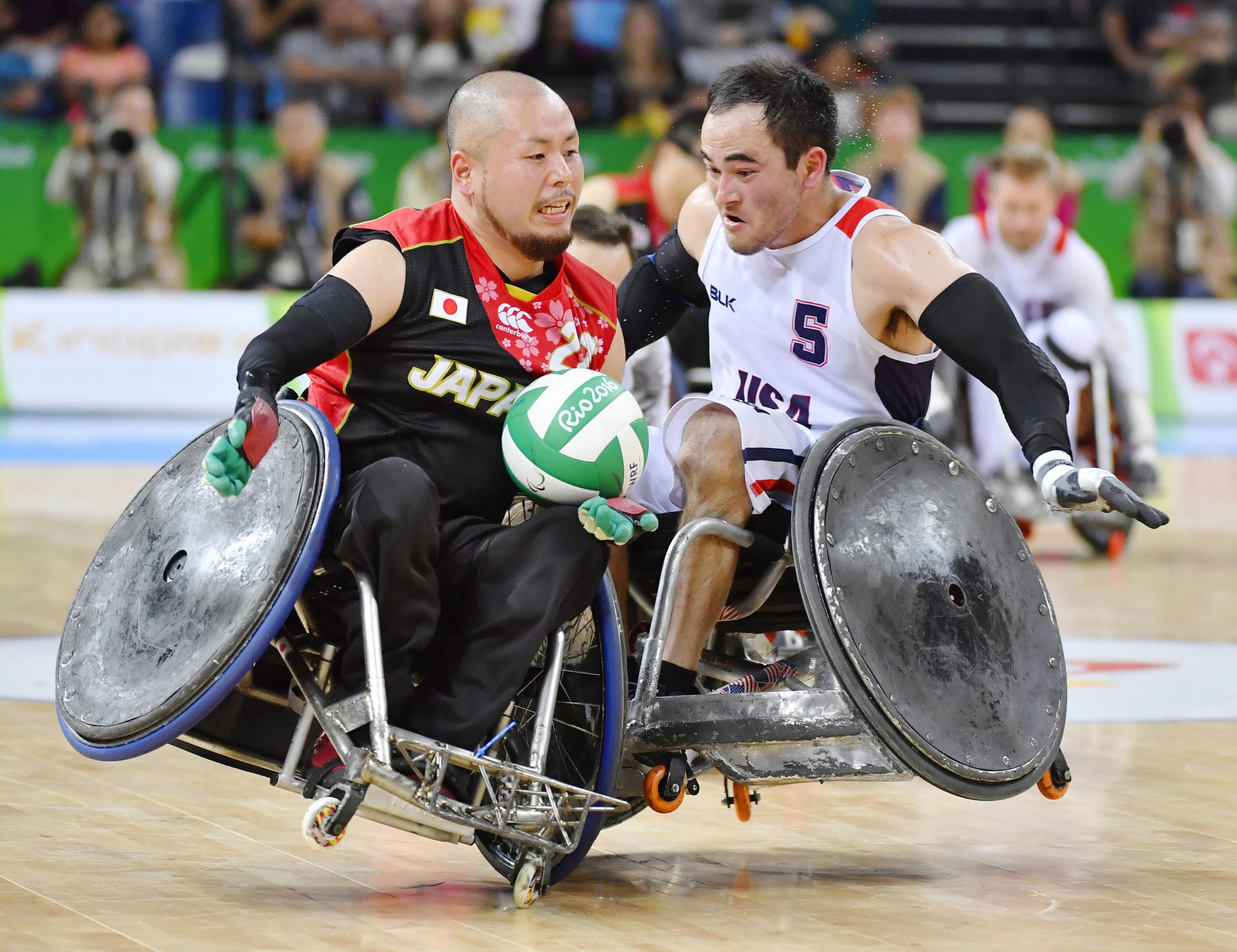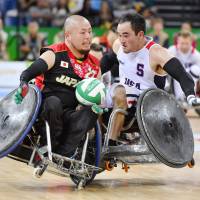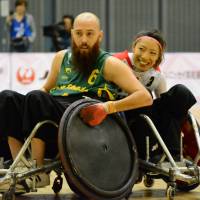Japan's No. 7 catches the ball but before he has time to react, a hulking, tattooed Australian is bearing down on him.
The collision sends a jarring squeal of metal against metal around the arena, and the crowd winces in unison before peering back through its fingers toward the action.
Welcome to the world of wheelchair rugby, where smashing into opponents at full speed is not just legal, it's an essential part of a sport that was originally known as "murderball."
"If you've never seen the sport and you come to it, all of a sudden these guys in wheelchairs are slamming into one another," United States head coach James Gumbert told The Japan Times over the weekend at Chiba Port Arena, where the U.S., Japan and Australia were competing over four days in the Japan Para Championships.
"You're really taken aback because it goes against everything in society," he said. "It's like, 'Oh my gosh, what are these guys doing? They're just killing each other.' That's the beauty of it. A lot of these guys were highly competitive before they were injured and this sport really matches that need."
Wheelchair rugby is one of the world's most popular Paralympic sports, and drew an estimated crowd of 15,000 to the Rio 2016 final between the U.S. and Australia. Australia took the gold after beating the Americans 59-58 in double overtime, while Japan claimed bronze with a 52-50 win over Canada.
"Being in Rio was incredible," said U.S. player Jeff Butler, who took up the sport after breaking his neck in a car accident at the age of 13. "Everyone looks at us like, 'Oh, you guys play rugby? You guys are crazy!' That's kind of the reaction you get from athletes from other countries. We're a little bit like rock stars."
Wheelchair rugby features two teams of up to 12 players — with four from each team allowed on the court at any one time — trying to score points by carrying the ball across the goal line at either end of the court.
Players use wheelchairs modified to withstand the frequent high-impact collisions, with bashed-up metal bumpers and spoke plates creating a fearsome appearance not unlike something out of the "Mad Max" movies.
Both men and women can play on the same team. Earlier this month, 26-year-old Kae Kurahashi became the first woman to represent Japan when she made her debut in a three-nation tournament including the U.S. and Canada in Birmingham, Alabama.
"It might look frightening from the outside, but when you play it's not so scary," Kurahashi told The Japan Times after appearing in Japan's 54-50 win over Australia on Saturday morning, where she was the only woman to feature on any of the three competing squads. "It's actually a lot of fun crashing into each other.
"I want to get into the team for the Olympics," she said. "I'm still at the learning stage, so the thing for me to concentrate on at the moment is picking up more experience."
Last year's Rio Paralympics were dogged by financial problems and low public interest in the run-up to the opening ceremony, but the event itself turned out to be the second-highest-attended Paralympics ever, following London 2012.
Tokyo will attempt to raise the bar in 2020, and Gumbert believes Japan will be a capable host.
"You hear about the adversity that the hosts face in the build-up to the games, in London and Rio, Athens, all of those," he said. "Then when you get there, it's fantastic. It's the people that make the games, and the people of Japan have done so much already in making us feel welcome. I have no doubt that their ability to put on a show is going to be fantastic."
Spectators watching the Saturday morning session at Chiba Port Arena were invited to try out the wheelchairs following the day's first match, with some tentatively moving around the court and others gleefully smashing into each other.
"Sometimes taking a big hit in a game will kind of wake you up," said Butler. "You'll be playing slow or you'll be out of your groove for some reason, and then you'll take one of those big hits and it kind of snaps you back into it.
"You need a streak of physicality. It's a full-contact sport and you have to be a little bit brave or a little bit stupid to play it. If you watch long enough you'll see the kind of collisions that make you cringe a little bit. But that's why we play it."
The U.S. beat Japan 52-51 in Sunday afternoon's final to claim the Japan Para Championships title. The Americans are determined to win Paralympic gold in Tokyo after coming so close in Rio, but Gumbert is not bitter about the result of last year's final.
"It was the best game ever played," he said. "Double overtime in front of 15,000 people — it was the best game ever played in our sport. We were three seconds and two feet of being tied and going into another overtime. It was a great match but we're really excited that we were able to come to Japan and get a chance to play them again."






